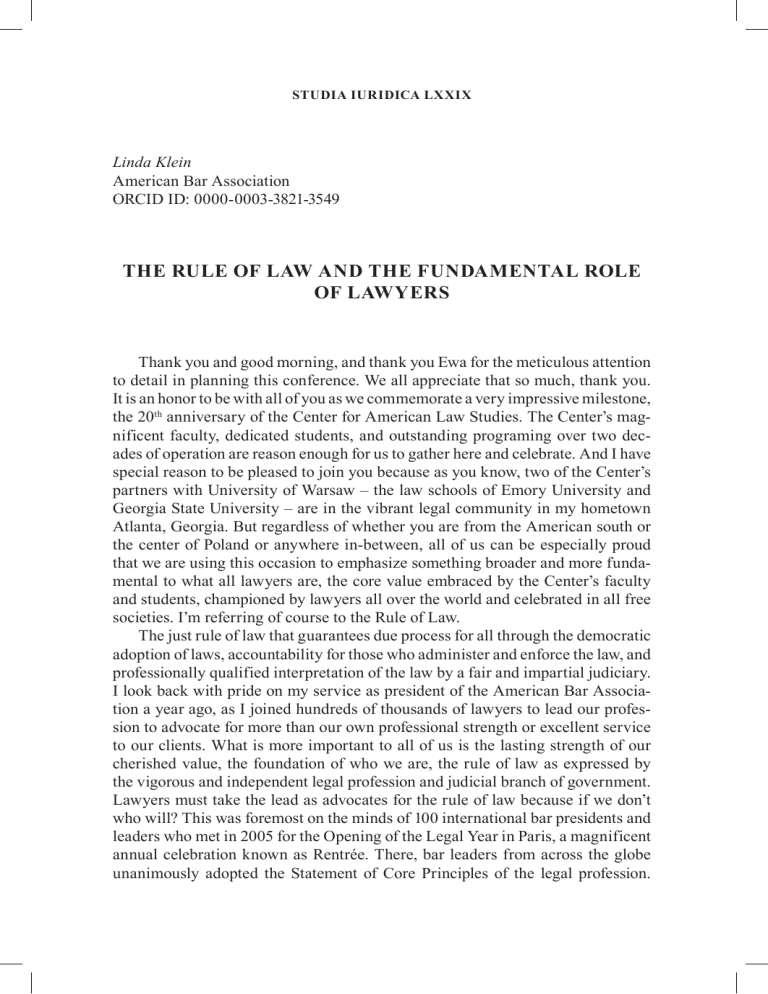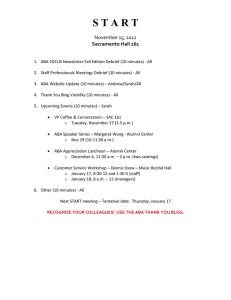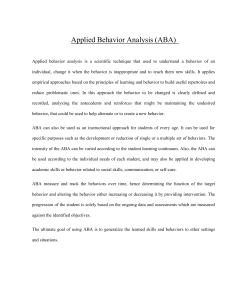
STUDIA IURIDICA LXXIX Linda Klein American Bar Association ORCID ID: 0000-0003-3821-3549 THE RULE OF LAW AND THE FUNDAMENTAL ROLE OF LAWYERS Thank you and good morning, and thank you Ewa for the meticulous attention to detail in planning this conference. We all appreciate that so much, thank you. It is an honor to be with all of you as we commemorate a very impressive milestone, the 20th anniversary of the Center for American Law Studies. The Center’s magnificent faculty, dedicated students, and outstanding programing over two decades of operation are reason enough for us to gather here and celebrate. And I have special reason to be pleased to join you because as you know, two of the Center’s partners with University of Warsaw – the law schools of Emory University and Georgia State University – are in the vibrant legal community in my hometown Atlanta, Georgia. But regardless of whether you are from the American south or the center of Poland or anywhere in-between, all of us can be especially proud that we are using this occasion to emphasize something broader and more fundamental to what all lawyers are, the core value embraced by the Center’s faculty and students, championed by lawyers all over the world and celebrated in all free societies. I’m referring of course to the Rule of Law. The just rule of law that guarantees due process for all through the democratic adoption of laws, accountability for those who administer and enforce the law, and professionally qualified interpretation of the law by a fair and impartial judiciary. I look back with pride on my service as president of the American Bar Association a year ago, as I joined hundreds of thousands of lawyers to lead our profession to advocate for more than our own professional strength or excellent service to our clients. What is more important to all of us is the lasting strength of our cherished value, the foundation of who we are, the rule of law as expressed by the vigorous and independent legal profession and judicial branch of government. Lawyers must take the lead as advocates for the rule of law because if we don’t who will? This was foremost on the minds of 100 international bar presidents and leaders who met in 2005 for the Opening of the Legal Year in Paris, a magnificent annual celebration known as Rentrée. There, bar leaders from across the globe unanimously adopted the Statement of Core Principles of the legal profession. 10 Linda Klein The signatories called on all bar associations throughout the world to actively support the rule of law. They recognized how indispensable the rule of law is to ensure transparent governments – governments committed to justice – that promote stable societies and respect the basic human, civil, and legal rights of all people. As important, the statement of our core principles informs freedom-loving people of fundamental principles to which we are beholden as lawyers – not as an occupation or trade, but as profession. And the statement pointedly notes something that can be easy to forget: that the principles of the rule of law must never, ever yield to any perceived or actual emergency of the moment. The core principles of the legal profession articulate the fundamental missions and activities of bar associations the world over. As a global leader of the rule of law issues and the world’s largest voluntary bar association, the American Bar Association has consistently supported efforts to build a strong, cohesive global movement to promote these fundamental principles. My pride as ABA president was never greater than when international bar leaders would tell me that the ABA and American Justice System are beacons of freedom and examples to which developing nations aspire and all nations respect. Longstanding ABA principles and activities support the principles of the rule of law – that an independent legal profession cannot and must not bend to the will of government, that independent courts must not be influenced by public or political pressure, and that access to justice is assured for all, even for the least powerful. It is our conviction that it is the first and foremost responsibility of the organized bar in every nation, to promote these principles and oppose any efforts to erode them. We lawyers, through the strong voice of our bar associations, must constantly remind governments and the public they serve that society must not be ruled by passions of the mob or the whims of powerful leaders, but by democratically enacted law. Regrettably, people throughout the world continue to live with corruption, poverty and widespread human rights abuses in the hands of authoritarian regimes and in the chaos caused by failed governments. Our bar associations must be the lighthouse of hope for those who yearn to live in nations governed by the rule of law. While a rule of law defines our quest to live in a world of stability, freedom and justice, its absence lies at the heart of some of the world’s greatest global challenges – terrorism, pandemics and other disasters, corruption, state-sponsored violence, and poverty. Lawyers know that the rule of law is the best antidote to these and other problems, and we must constantly be the tribunes that call this to the public attention. A vital step for all lawyers and judges throughout the world is therefore to recognize that we are one legal community. We have the responsibility, the duty, to work together, to stand in common purpose, to solve these problems by establishing and maintaining stable societies based on the rule of law. The ABA Section of International Law has a long and distinguished history of organizing exchange programs THE RULE OF LAW AND THE FUNDAMENTAL ROLE OF LAWYERS 11 and building relationships with the legal professions of many nations. The ABA section of Civil Rights and Social Justice has fostered leaders who have taken on the duty to promote the rule of law. The ABA Center for Human Rights advances our advocacy for human rights observance as a key element of the rule of law. And the ABA’s flagship Rule of Law Initiative, which we established in central and eastern Europe after the fall of the Berlin Wall, has gone on to work with volunteers and professional staff in more than one hundred developing rule of law nations, across five continents, and now operates in more than fifty countries. Rule of Law initiative lawyers respond to the needs of local legal communities to promote judicial reform and integrity, strengthen the legal profession and support legal education systems, combat corruption and human trafficking and promote gender equality, to name just a few areas. These initiatives are most effective when undertaken in partnership with local, national and international bar associations, non-governmental organizations and other entities and individuals that stand shoulder to shoulder to advance the rule of law. Our work throughout the ABA, in partnership with state and local bar associations across America, provide the authority and expertise that enable us to hold our own government accountable, to speak out, and act when due process is undermined, when access to justice is curtailed. Our work, for example, inspired hundreds of American lawyers who at a moment’s notice went to airport terminals to volunteer to represent travelers who were detained after the government instituted its travel ban in the name of national security. Throughout our history, the ABA has made a special focus on promoting an independent judiciary. An independent judiciary provides a crucial check against authoritarian tendencies. It is not surprising that those who try to undermine a democratic state often start by disparaging the judiciary. Outside the United States, we have successfully petitioned international bodies to investigate violence and other retaliations against judges for doing their jobs. And within the U.S., the ABA painstakingly reviews and publicly announces the professional qualifications of individuals proposed to serve as federal judges. We advocate for proper funding of the courts. We provide civics education on the importance of judicial independence to securing political freedom. Our annual Law Day celebrations each May 1 for students and members of the public vividly highlight the importance of the society based on laws and fair, peaceful resolution of disputes. In America we must be vigilant as new threats emerge. The ABA website has an on-line webinar called: “What Judges Do and Why it Matters”. The ABA is also updating our guide titled “Rapid Response to Unfair and Unjust Criticism of the Judges”. This pamphlet urges state and local bar leaders to prepare timely responses when politicians and others blatantly undermine the authority of the courts to interpret the law and fairly adjudicate disputes. As the ABA’s current president, noted during her visit to Warsaw last month, our association has been closely watching the situation in Poland and we are pub- 12 Linda Klein licly committed to standing with our Polish colleagues who stand for judicial independence. We plan to observe disciplinary cases against judges and will draw attention to any violations of international standards. We also are planning to study the process by which politically sensitive cases are assigned to judges and the impact that decisions have on legal professionals involved with a case. That is what bar associations do for each other and the ABA is proud to stand with our colleagues everywhere. Just a few weeks ago, I joined the ABA for a series of legal education programs in Paris to celebrate the 70th anniversary of the Universal Declaration of Human Rights. Our meetings were preceded by a visit to the beaches of Normandy on June 6, the 74th anniversary of D-Day. The troops from many nations who landed on the beaches that day in 1944 fought for and died for freedom for all, a freedom guaranteed under governments beholden to the rule of law. The Center for American Law Studies, our bar associations, and all institutions that promote the rule of law continue this fight and honor the memory and legacy of all who dedicated their lives so that we may live in freedom. Our visit to Paris took me away from Atlanta, which I’ve mentioned is my hometown. What’s special about Atlanta, what makes our legal community and bar especially proud, is that it’s also the hometown of Rev. Martin Luther King, Jr. Dr. King recognized that our nation was not perfect, that justice was not guaranteed for all, and the law did not serve all. But he courageously used the levers of nonviolent protest and full-throated advocacy to make our union more perfect, to fulfill the promise of our founders that justice is the purpose of government. Dr. King was patient and persistent. Consider his famous words, “the arc of the moral universe is long, but it bends toward justice”. May our presence here today, what we learn from each other, continue the work of the Center for American Law Studies and the commitment of our international bar associations, bend that arc further toward justice and enable us to live in safety, in prosperity, and freedom. Thank you. Summary The speech by Linda Klein – immediate past president of the ABA – has been presented as opening remarks during Poland-US Conference on the Rule of Law in Warsaw on 24 June 2018. In her speech Klein stated that the rule of law is expressed by the vigorous and independent legal profession and judicial branch of government. Lawyers must take the lead as advocates for the rule of law. Principles of the rule of law must never, ever yield to any perceived or actual emergency of the moment. Independent legal profession cannot and must not bend to the will of government, that independent courts must not be influenced by public or political pressure, and that access to justice THE RULE OF LAW AND THE FUNDAMENTAL ROLE OF LAWYERS 13 is assured for all, even for the least powerful. The most important responsibility organized bar in every nation is to promote these principles and oppose any efforts to erode them. The core principles of the legal profession articulate the fundamental missions and activities of bar associations the world over. As a global leader of the rule of law issues and the world’s largest voluntary bar association, the American Bar Association has consistently supported efforts to build a strong, cohesive global movement to promote these fundamental principles. KEYWORDS rule of law, ABA, legal profession, independent court Streszczenie Przemówienie Lindy Klein, ustępującej Prezydent ABA, zostało wygłoszone podczas konferencji polsko- amerykańskiej na temat państwa prawa w Warszawie 24 czerwca 2018 r. W swoim przemówieniu Klein powiedziała, że rządy prawa są realizowane przez energiczne i niezależne działania organizacji prawniczych oraz sądownictwo. Prawnicy są zobowiązani do tego, aby być liderami w działaniach na rzecz praworządności. Zasady rządów prawa nigdy nie powinny ulegać ani pozornemu ani faktycznemu kryzysowi występującemu w danej chwili. Niezależny zawód prawniczy nie może uginać się pod wolą władzy wykonawczej, a niezawisłe sądy nie powinny podlegać wpływom publicznej ani politycznej presji. Taki sam dostęp do sprawiedliwości powinien być zapewniony dla wszystkich, nawet dla najmniej wpływowych. Najważniejszą odpowiedzialnością organizacji prawniczych w każdym kraju jest promowanie tych zasad i przeciwdziałanie wszelkim próbom ich zniszczenia. Jako światowy lider w zakresie rządów prawa i największe na świecie stowarzyszenie prawników, American Bar Association konsekwentnie wspiera wysiłki na rzecz zbudowania silnego, spójnego i globalnego ruchu w celu promowania tych podstawowych zasad rządów prawa. SŁOWA KLUCZOWE państwo prawa, ABA, zawody prawnicze, niezawisłe sądownictwo

